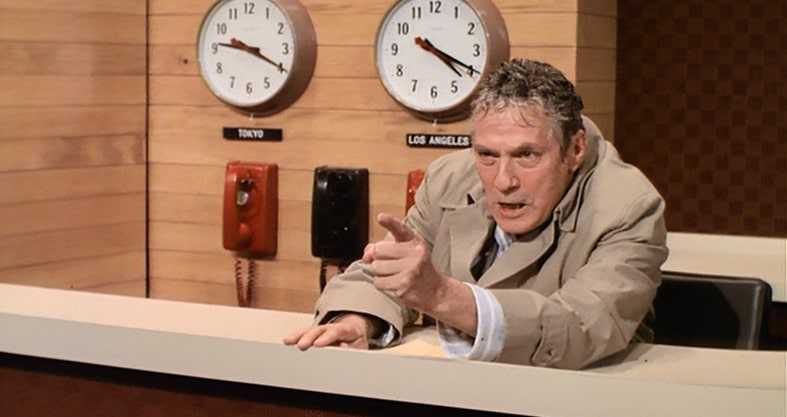We're Mad as Hell. What Now?
What good is a rant when everyone's delivering one?December 1, 2024
Screenshot of actor Peter Finch as Howard Beale in the film Network (1976)
It was a week or two before the election that I first started making the connection. I was up late again, scrolling through TikTok, watching video after video of people shouting—shouting at each other,1 shouting at the powers that be, shouting simply to shout about this or that.
Just a total sea of grievance, and I was letting it wash over me and not feeling particularly happy about it and scrolling madly. I started thinking about exactly what information/value I and anybody else getting these particular videos on their FYP2 were deriving from these rants.
Somehow I got to thinking about the film Network, and about the unrestrained ravings of the character Howard Beale, the news anchor turned “mad prophet of the airwaves,” whose famous speech in the movie galvanizes a politically resigned viewing audience into running to their windows across the nation to scream, “I’m mad as hell, and I’m not gonna take this anymore!”
When the movie came out in 1976, the idea of someone with an audience turned loose on the airwaves to spew their every unedited thought and thus move the minds of millions was novel, groundbreaking, and over the years, as we’ve moved from AM talk radio to Alex Jones to Twitch/YouTube streamers, people have come to see it as prescient. But I specifically bring up Twitch and YouTube because I’m starting to wonder what it means for the ranters and for their audience when anybody can set up a camera and a mic and get to venting.
In Network, Beale’s fulminations jolt his audience awake because they are an anomoly in a staid, stodgy, centralized media environment, giving voice to their basest frustrations. As Faye Dunaway, playing a cynical TV producer in the film, puts it:
The American people are turning sullen. They’ve been clobbered on all sides by Vietnam, Watergate, the inflation, the depression. They’ve turned off, shot up, and they’ve screwed themselves limp and nothing helps. So this concept analysis report concludes, ’The American people want somebody to articulate their rage for them.’ I’ve been telling you people since I took this job six months ago that I want angry shows.
The media environment today, though, has plenty of talking heads willing to articulate the people’s rage, and it’s anything but staid and stodgy, let alone still centralized. According to the Pew Research Center, more people every day are getting their news regularly from podcasts and social media, and when they do, it’s often delivered passively by influencers more concerned with maintaining audience attention than with any project of accuracy and/or depth.

“A very small minority of voters may ever encounter the carefully prepared written material that many professional journalists produce at any newsroom anywhere,” writes Matt Pearce, in the first of an unsparing trio of Substack newsletters analyzing the broken media/information landscape in the wake of the 2024 election. And he elaborates on this point in his second piece:
Consumers have gotten pretty tolerant of bullshit. By “bullshit” I’m referring broadly to the kind of stuff—like social media commentary, podcast chat shows or ChatGPT summaries—that can contain factual information but often contains nonsense, in a context where there’s zero consequences for bullshitting to begin with and then bullshitting even more. Consumers hardly ever realize it, but they hold traditional news media to vastly higher standards of accurate and ethical behavior than practically every other information source they encounter, even when they’ve started relying on those other information sources instead of the news media. It’s good consumers hold journalism to high standards. The problem here is that the bar is getting lowered, not raised, for everything else.
In Network, Beale explains on air that he himself began deviating from his written news scripts because he “just ran out of bullshit,” so it seems bullshit has now swung to the other extreme, from just-the-facts reportage offering no broader view of societal issues to generalized opinions from frustrated internet yappers who rarely take the time to back up their thoughts with deeper analysis relying on hard data and historical precedent.
So I guess what I’m ultimately thinking about is this: if unvarnished, low-information rage and frustration were thought to be what would wake people from their stupor in 1976, and if unvarnished, low-information rage and frustration are what we now have in abundance (from hundreds upon thousands of decentralized sources rather than any set of centralized sources), then how effective is that rage, really, now, at moving people to action? To put it another way, if everyone’s blowing off steam, how does anybody stand out in the mist? Is there now a different sort of message, packaged in a different way, that’s required to actually break through to large numbers of people? Does it involve coming to topics with a great amount of care, curiosity, and consideration and less unearned certainty and/or self-righteous grandstanding?
I don’t know the answer here, and I’m not looking to scold or tone police. I just wonder if there’s not some middle ground that we haven’t found yet. And if we’re all potential media influencers now,3 it sure seems like something we’re all gonna have to start thinking about.
Footnotes
-
Not just about politics but an awful lot about politics: the left shouting at those on the right, those on the right returning serve; “leftists” and “liberals” shouting at each other, talking as if the two labels/sides are clearly defined and agreed upon in the first place; third-party advocates shouting in all sorts of directions.4 ↩
-
And I know I wasn’t the only one, given how much engagement these sorts of videos were getting. ↩
-
Meaning all of us participating in the ecosystem of algorithmic social media, which I would argue is now just as much a part of the mainstream media as any legacy outlet, given that the post of any random schmoe can hit like a slot machine and spread to thousands or even millions. ↩
-
Yes, I’ve got a few footnotes here. Apologies in advance. I promise they won’t be part of every post, but I’m trying to throw a bit of everything into this early entry to stress-test the blog layout I’ve been building for this site in Gatsby. Please clap. ↩
